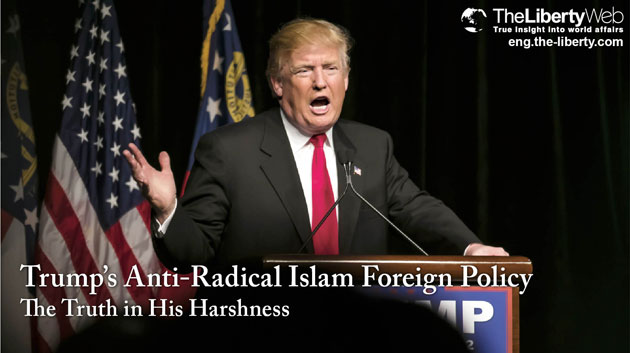Trump’s Anti-Radical Islam Foreign Policy
The Truth in His Harshness
In his foreign policy speech in Youngstown, Ohio on August 15, Republican Presidential candidate Donald Trump announced his foreign policy with regard to Radical Islam.
“Today” he said, “we begin a conversation about how to make America safe again”. He mentioned how the U.S. overcame fascism, Nazism and communism in the 20th century, and that the next great threat is Radical Islam.
The Ground for Accusation of Obama’s Role in the Rise of ISIS
Trump has been losing supporters for his provocative language, but his policy on Radical Islam is the one area where he has more support than Democratic candidate Hillary Clinton.
One of his provocative accusations was, “the rise of ISIS is the direct result of policy decisions made by President Obama and Secretary Clinton.” Doubtless, many were dumbfounded, but he had his grounds for saying so.
Here is what happened.
When the U.S. defeated former president of Iraq, Saddam Hussein, they eliminated the Sunni Islamists, and built a government based on the Shia sect. But they failed to make the government democratic. The Sunni side could not take part in government, and were thus oppressed.
Obama became the U.S. President on the pledge to withdraw U.S. troops from Iraq by 2011. In the end he did withdraw the troops, but with absolutely no regard for the public order in Iraq. The resultant imbalance in power created a void, which was filled by a terrorist organisation called ISIS who now prowl the Middle East.
So, as Trump said, the Radical Islamic problem arose from a failure of policy decisions made by President Obama and Secretary Clinton. On this point, Trump takes a clear lead.
Trump’s Policy Isn’t Extreme
What was different about this speech from Trump’s previous speeches was that in his fight against ISIS his first act as President “will be to establish a Commission on Radical Islam – which will include reformist voices in the Muslim community who will hopefully work with us.”
Connecting with reformist voices in the Muslim community is a sure step towards reforming Islam.
“I also believe that we could find common ground with Russia in the fight against ISIS”, he commented.
This is a more realistic plan compared to the current administration constantly creating disagreements with Russia, and its other plans to obliterate ISIS.
But we must remember that Trump’s whole idea is not as easy as it sounds, especially if we look back over America’s historic tendency of declaring justice through war, treating enemies like evil demons, and bringing about wars of extermination.
Japan’s Role in the Radical Islam Problem
A noteworthy point is Trump’s “call for an international conference focused on” dealing with Radical Islam. The time for Japan to become their mediator in the proposed international conference is drawing near. This is because behind this problem lies the battle between monotheistic Christianity and Islam, and Japan is a country that has succeeded in harmonizing two different religions: Shinto and Buddhism. Japan must acquire greater agency in the international community.
In this setting, it is clear what Japan must say. It is the same thing that Master Ryuho Okawa founder of Happy Science said in his July public lecture entitled “The Light That Will Save The Earth”:
“Allah does not plan to cause grief and sorrow to innocent people.”
“Mercy is the love that we give to others after knowing that others have within them the same thing we have within us. We must believe that other people have within them the same diamond: the proof that one is the child of God. And we must believe that the path of enlightenment will open unto them through tireless effort.”
The only extend of Japan’s contribution to international problems has been monetary support, and seem otherwise disinterested. What Japan should be doing is contributing opinions worthy of their national standing to help guide the world in making the right decisions.
The U.S. President virtually shoulders the world’s destiny. Japan must help that person to create a world that can tolerate various different values.



















